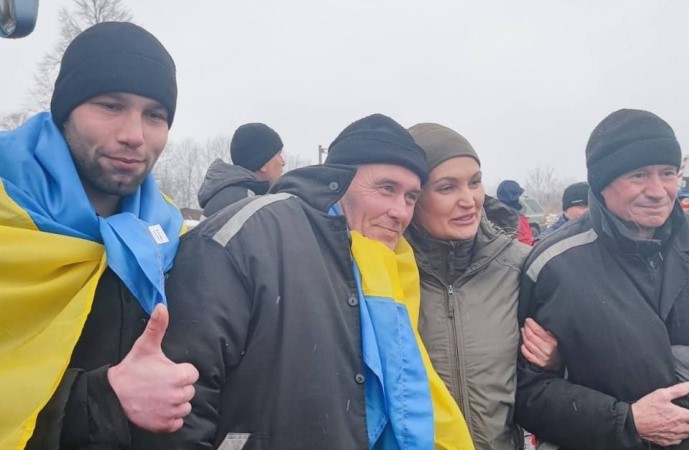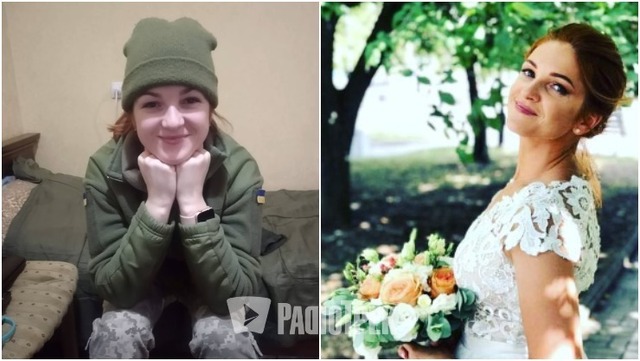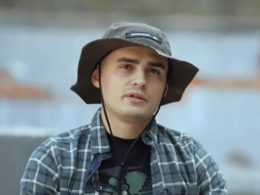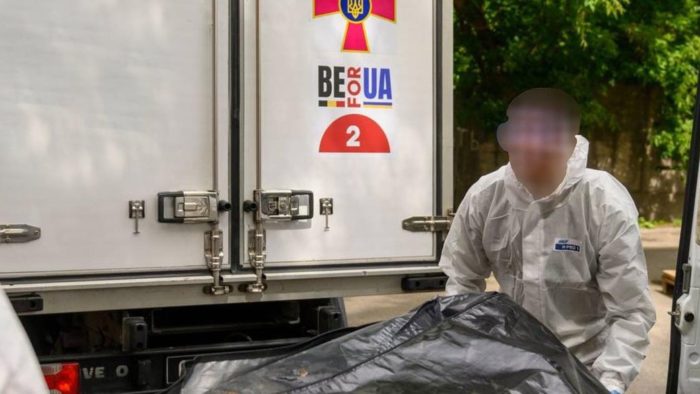Pastor Anatoliy Voloshyn, who was among the 130 Ukrainians exchanged on March 7, 2023 has finally returned home. The sight of the Ukrainian flag waving proudly and the first phone call to his family brought immense joy. Voloshyn shakes his head as he recounts the harsh words and abuse he endured during his captivity, “They shouted at us, saying that ‘Ukraine isn’t waiting for you. They’ve forgotten all about you. Ukraine doesn’t need you; you’re nothing but trash.”
Joining the territorial defense forces at the start of the invasion, Voloshyn sustained multiple injuries and took refuge in the bunkers of Azovstal before being captured. He reflects on his unexpected journey.
“In my old age, I never imagined I would end up in prison or experience life in a filtration camp.”
Voloshyn returned from captivity on March 7, 2023, but his friends and relatives had believed him to be deceased since his name was absent from all lists following the Russian strike on Olenivka on July 29, 2022.
During his time in captivity, Voloshyn encountered Russian officers who were surprised by his occupation, saying, “We thought you were a professor.” Voloshyn had, in fact, worked as a bulldozer operator for 20 years. In another instance, Russian inspectors labelled him a “fascist-intellectual” due to his glasses and serious appearance, despite the irony of their own behaviour. But, Voloshyn emphasizes that “We were simply defending our homes and cities.”
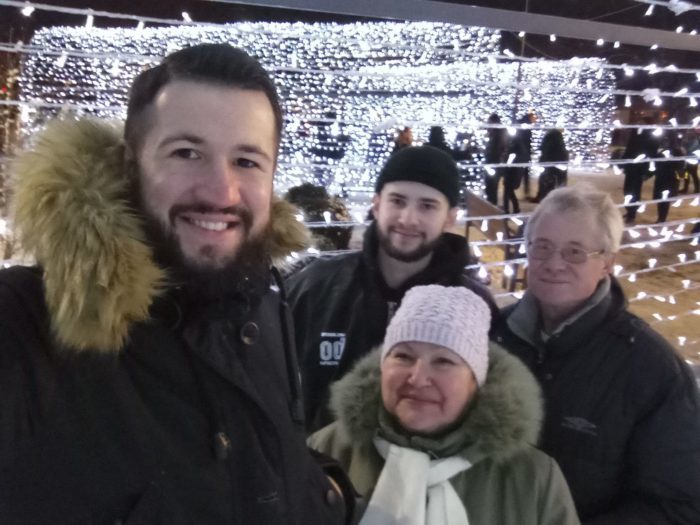
Injury and treatment under Russian bombs
Anatoliy Voloshyn served as pastor in the Protestant Church of Good Changes, but enlisted in the Mariupol Territorial Defense Forces on February 25, 2022, where he was appointed commander of a combat unit. Explaining his decision to join Ukraine’s fight for freedom, Voloshyn says:
“As a pastor, this decision was not an easy one for me. Only God can judge whether it was right or not. I wasn’t afraid of death; I simply wanted to live a free man.”
How I “bribed” my way into joining Ukraine’s Territorial Defense Forces
However, his commitment came at a cost. On March 14, 2022, he sustained severe injuries from a mine explosion near his vehicle, resulting in broken ribs, torn arm muscles, and damaged nerves.
Voloshyn received medical treatment in a hospital, but all the while, the city of Mariupol was under continuous Russian bombardment.
“A shell exploded beneath the window of my ward, shattering the glass.” recalls the pastor.
Forced to seek shelter in the hospital basement with tubes still attached to his body, Voloshyn stayed there for an extended period. On March 16, 2022, he and other wounded individuals were transported to the Azovstal steel plant, which was subsequently bombed daily.
For two months, from March 16 to May 17, 2022, Voloshyn found himself on the premises of Azovstal alongside hundreds of wounded servicemen.
Bunker hospital in Azovstal amidst bombardment
In the midst of relentless bombardment, Anatoliy Voloshyn recounts the challenging conditions at the bunker hospital of Azovstal where around 300 individuals sought refuge. Despite dwindling supplies, they managed to sustain themselves with the help of a generator and stoves. However, rations were scarce, and portions became smaller and smaller as stocks ran out.
“Two cans of mackerel were divided among five people. Eventually, we received only half a plastic cup of food and 200 grams of water.”recalls Voloshyn.
The lack of food and drinking water took a toll on everyone’s minds and bodies. Some people lost up to 40 kilograms of weight, including Voloshyn himself, who shed 22 kilograms in just two months. Their living conditions were far from comfortable as they scavenged for materials to sleep on and keep warm.
“Some of us even wore two or three pairs of pants to keep warm. However, despite the hardships, there was a remarkable resilience among the group, as no one fell ill, and wounds healed,” the pastor notes.
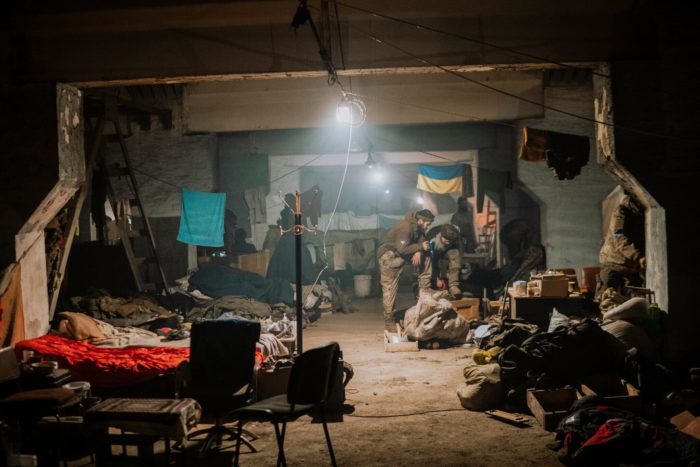
Living in a constant state of tension, they endured relentless bombings by Russian artillery from the air and sea. Every time a plane flew overhead, the people crossed themselves and prayed fervently. Water was also scarce, and the pastor longed for simple comforts like soaking in a bathtub or savoring a delicious meal.
“I longed to soak in a bathtub, to warm up, to finally wash my hair, and savor something delicious.”
Amidst the chaos, moments of respite were cherished. Voloshyn recalls the uplifting sight of the sky and greenery outside the bunker, reminding him to keep living and dreaming for a better future. However, communication with the outside world was lost, leaving them in the dark about the ongoing situation. The sounds of shelling and bombs were a constant reminder of the danger they faced. The hospital itself was hit several times, causing injuries and loss of life.
The soldiers, the civilians and the wounded coped with the dire circumstances in their own ways. Voloshyn, as a pastor, took on the role of supporting and encouraging those around him. Recognizing the importance of a positive mindset, he frequently spoke to the persons in the basement bunker, encouraging them to stay positive.
“Listen guys, let’s not be pessimistic… It won’t help us at all!”
Months of uncertainty in Russian prison camps
In a sudden turn of events, on May 18, 2022, Kyiv issued an order for the Azovstal warriors to lay down their arms, and Anatoliy Voloshyn made a vow to himself as he left the bunker with the other warriors.
“If the Lord has granted me this time, I must survive and share my experiences with others.”
Evacuation of Ukrainian soldiers is underway from Azovstal in occupied Mariupol
Voloshyn’s arduous journey continued as the prison convoy arrived in the Russian prison camp of Olenivka. The pouring rain brought a sense of relief, as he washed his head and face for the first time in two months. Reflecting on the experience, Voloshyn shares, “I’ve always loved rainy weather. It inspires me to contemplate life.”
Placed in a barracks with around 450 fellow prisoners, Voloshyn admits that they were constantly plagued by hunger. The food portions were meager, and Voloshyn refers to the soup and porridge as “water with cabbage”. He describes the conditions, stating that there were about three thousand people imprisoned in Olenivka prison camp.
Olenivka served as a filtration camp, and the constant sounds of cannon fire reminded them of the proximity to the front lines. The dangers were ever-present, with treacherous Russian shots being fired from beneath the camp walls.
On the night of July 29, 2022, tragedy struck as an explosion destroyed the building where Ukrainian prisoners of war were held. However, Voloshyn and others had been transferred to Sverdlovsk (renamed Dovzhansk) in Luhansk Oblast on June 10, 2022, a development unknown to his children in government-controlled Ukraine.
Murder of Ukrainian POWs in Olenivka prison: everything we know
For over nine months, Voloshyn’s whereabouts were unknown to his family. They searched for him tirelessly, believing he had perished after the mass killing of Ukrainian prisoners in Olenivka. Recounting their emotional journey, his son Yevhen shares, “We mourned our father. People visited us and expressed their sympathy.” But hope was rekindled when they discovered that their father was still held captive, and they realized that the published lists of the dead soldiers in Olenivka was not certain.
Desperate for answers, they reached out to various organizations, including the Red Cross, but to no avail. It seemed like an impossible task to locate their father amidst the chaos of war.
Resilience in the Sverdlovsk penal colony
Anatoliy Voloshyn recounts his time in the Sverdlovsk penal colony in occupied Luhansk Oblast, referring to it as a camp where prisoners were subjected to multiple interrogations and humiliating searches. However, the conditions were better; they were even assigned beds with white pillowcases and sheets. The prisoners washed them themselves whenever the authorities provided them with some soap powder.
Living on the second floor with 200 beds, Voloshyn couldn’t communicate freely with fellow prisoners, understanding the risks involved.
“I only spoke to those who I believed could be trusted.”he says.
Celebrating his 65th birthday in the Sverdlovsk penal colony, pastor Voloshyn found solace in prayer, literature and games.
“There was also a children’s Bible in Ukrainian. They even had classics like Hugo and George Sand. I chose fiction and classical literature.”
Engaging in activities like chess and watching Russian propaganda programs, he found inspiration and hope as he and the other Ukrainian inmates realized that Ukraine was receiving help from abroad.
“We knew that we weren’t alone, so we would win. I lived by that belief.”
Despite the challenging circumstances, Anatoliy mentions that hunger pangs subsided in Luhansk Oblast. Describing the meals, he says, “They fed us porridge: pearl barley, wheat, and barley again. For lunch, there was always soup with noodles or borscht. They gave us bread and sweet tea. I actually managed to gain 15 kilograms there.”
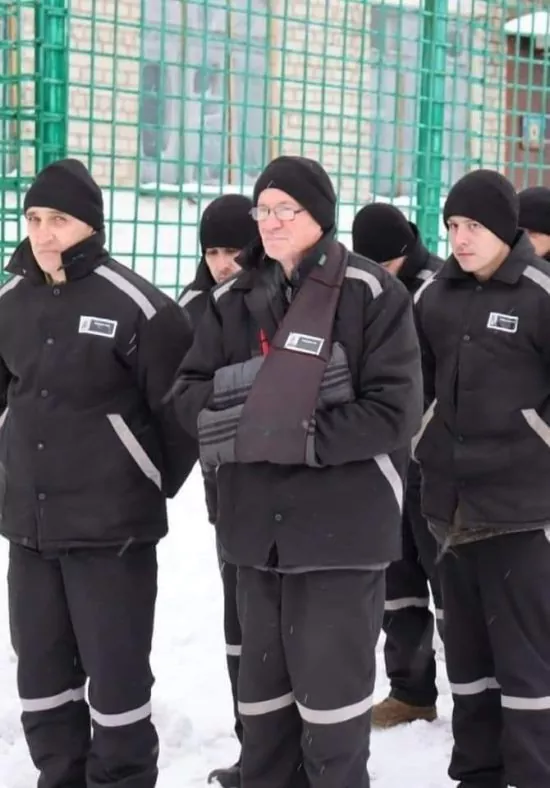
Work assignments were given to the hardened criminals who shared their quarters, and Voloshyn observed their efforts, such as constructing sturdy beds and making coffins from ammunition boxes. Reflecting on his own situation, he remarks that he was not obliged to do any hard work because he was wounded.
Finding moments of brightness, the pastor would share jokes to uplift the spirits of his fellow prisoners.
“When appropriate, I would joke. Some nonsense would come to mind, and everyone would laugh. I enjoy word games and shared them with the other prisoners.”
However, there were many men who became so depressed they even contemplated suicide.
“I constantly talked to these men him about how their brothers, sisters and mothers were waiting for them, that the Lord did't want to take them yet.”
Liberation and return to Ukraine
In February 2023, a commission visited the colony and took photographs of the prisoners.
“They told us to stop. The women in the delegation took photos. Later, these pictures were published on the Internet, and my children saw them.”
The long-awaited exchange finally took place on March 6, 2023. Voloshyn describes the journey to the border as a mix of anticipation and uncertainty.
“We got into KamAZ trucks. Joy was overflowing. But there was a thought: what if this doesn’t happen, and they take us somewhere else?”
Crossing the border in Sumy Oblast, emotions overwhelmed Voloshyn and his fellow prisoners. They were provided with phones and warm suits, and his first priority was to find out what was happening in Ukraine.
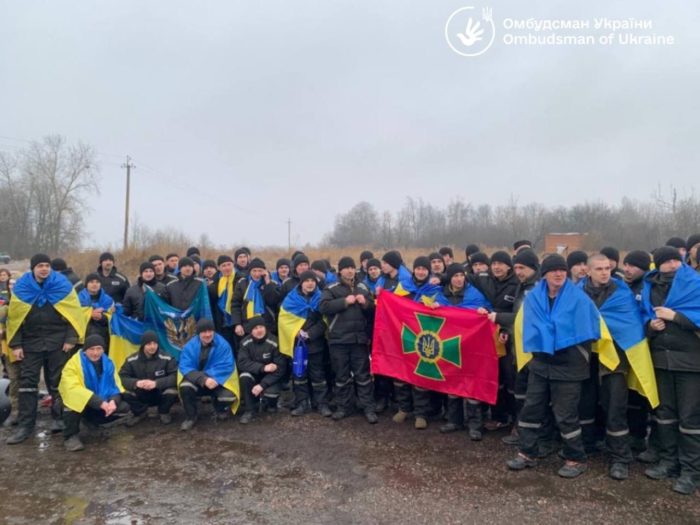
Now residing in Kyiv with his sons, pastor Voloshyn cherishes the precios moments with his family. He admits that he often thinks of those agonizing days in captivity, but tries to reflect more on his past and future dreams.
“When I was in captivity, I dreamed of sitting at the table with my sons and visiting the steam bathhouse together.You know, at 40, I had two wishes - to learn how to roller skate and to experience being in the open ocean during a storm. I achieved the first wish. Now I want to make my second dream come true, which is 24 years old already.”
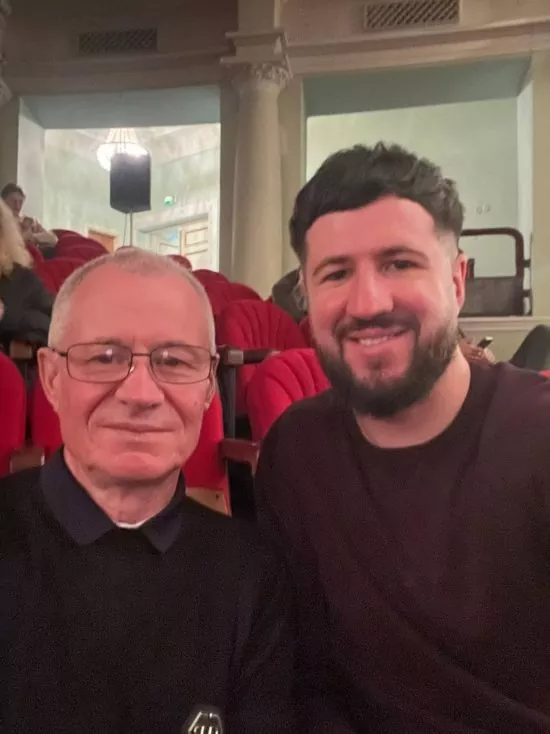
Pastor Anatoliy Voloshyn looks forward to receiving treatment for his arm and joining the chaplains’ battalion in the Armed Forces of Ukraine. His ultimate goal is to return to his beloved hometown of Mariupol and his flock at the Church of Good Changes, but only after the last Russian occupier is driven out. In the meantime, he cherishes the precious moments spent with his family.

